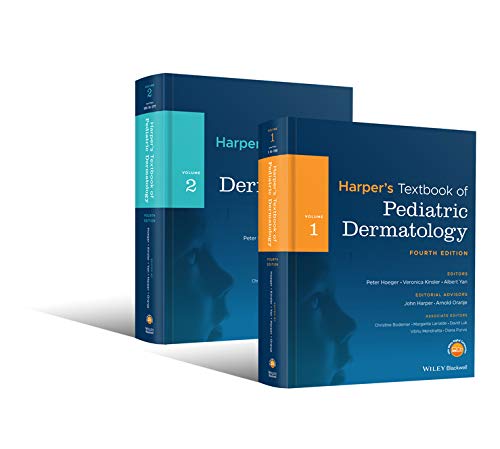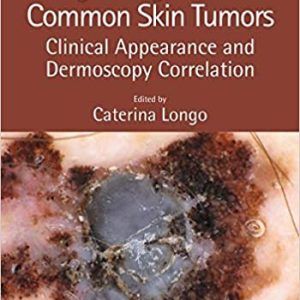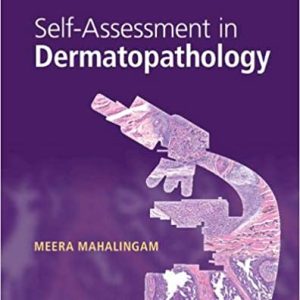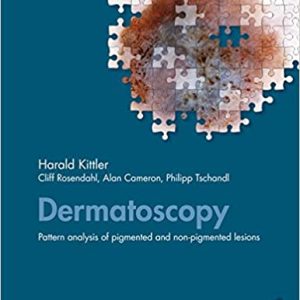Harper’s Textbook of Pediatric Dermatology 4th Edition Two Volume set
- Publisher : Wiley-Blackwell; 4th edition (December 16, 2019)
- Language : English
- FORMAT EPUB + CONVERTED PDF
- ISBN-10 : 1119142199
- ISBN-13 : 978-1119142195
Harper's Textbook of Pediatric Dermatology delivers crucial clinical insights and up-to-date research information that spans the breadth of the field. As the most comprehensive reference book on this subject available, this revised fourth edition will support and guide the daily practice of both dermatologists and pediatricians across the world.
From the Inside Flap
VOLUME 1
Harper's Textbook of Pediatric Dermatology
FOURTH EDITION
A consummate classic with a fresh approach to pediatric dermatology
Children??s skin is different. Maturation affects the epidermal barrier, the cutaneous microbiome, adnexal structures, vasculature, and transcutaneous absorption of drugs. The immature skin is more susceptible to pathogens and environmental disruption. Many genetic disorders are either present at birth or manifest early in childhood. Skin diseases thus present differently in children than in adults. Pediatric dermatology has seen significant advances over the last decade, particularly in the field of molecular genetics research, which has furthered our understanding of the pathogenesis of many skin diseases and the development of new approaches to treatment.
This fourth edition of the Harper classic provides state-of-the-art information on all aspects of skin disease in children. It covers the diagnosis and treatment of all conditions – both common and rare – with a consistently evidence-based approach. Existing content has been refreshed and fully updated to reflect emerging thinking and to incorporate the latest in research and clinical data – especially at the genetic level.
This new fourth edition includes:
- Greater focus on the genetics behind skin disease, including new genes/genodermatoses, progress in genetic analysis, and stem cell transplants
- Increased coverage of lasers and other technologies used to treat skin disease
- More summary tables, learning points, tables of differential diagnosis, and clinical algorithms for diagnosis and management
- Additional online features, including patient information links and multiple-choice questions
Harper's Textbook of Pediatric Dermatology delivers crucial clinical insights and up-to-date research information that spans the breadth of the field. As the most comprehensive reference book on this subject available, this revised fourth edition will support and guide the daily practice of both dermatologists and pediatricians across the world.
From the Back Cover
VOLUME 1
Harper's Textbook of Pediatric Dermatology
FOURTH EDITION
A consummate classic with a fresh approach to pediatric dermatology
Children??s skin is different. Maturation affects the epidermal barrier, the cutaneous microbiome, adnexal structures, vasculature, and transcutaneous absorption of drugs. The immature skin is more susceptible to pathogens and environmental disruption. Many genetic disorders are either present at birth or manifest early in childhood. Skin diseases thus present differently in children than in adults. Pediatric dermatology has seen significant advances over the last decade, particularly in the field of molecular genetics research, which has furthered our understanding of the pathogenesis of many skin diseases and the development of new approaches to treatment.
This fourth edition of the Harper classic provides state-of-the-art information on all aspects of skin disease in children. It covers the diagnosis and treatment of all conditions – both common and rare – with a consistently evidence-based approach. Existing content has been refreshed and fully updated to reflect emerging thinking and to incorporate the latest in research and clinical data – especially at the genetic level.
This new fourth edition includes:
- Greater focus on the genetics behind skin disease, including new genes/genodermatoses, progress in genetic analysis, and stem cell transplants
- Increased coverage of lasers and other technologies used to treat skin disease
- More summary tables, learning points, tables of differential diagnosis, and clinical algorithms for diagnosis and management
- Additional online features, including patient information links and multiple-choice questions
Harper's Textbook of Pediatric Dermatology delivers crucial clinical insights and up-to-date research information that spans the breadth of the field. As the most comprehensive reference book on this subject available, this revised fourth edition will support and guide the daily practice of both dermatologists and pediatricians across the world.
Showing 61–72 of 375 resultsSorted by latest
-
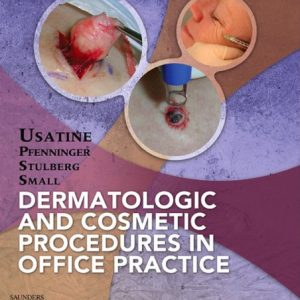
Dermatologic and Cosmetic Procedures in Office Practice
$7.99 Add to basket -

Dermatology: Visual Recognition and Case Reviews 2nd Edition
$12.99 Add to basket -
Sale!

Connective Tissue: Types, Functions and Clinical Aspects
Original price was: $58.99.$9.99Current price is: $9.99. Add to basket -
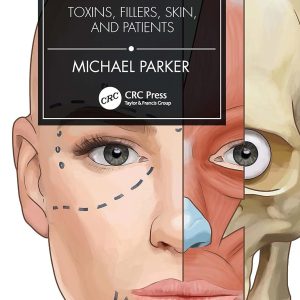
Fundamentals for Cosmetic Practice: Toxins, Fillers, Skin, and Patients 1st Edition
$14.99 Add to basket -

Advanced Skin Cancer A Case-Based Approach
$13.99 Add to basket -

Rhinoplasty in Practice An Algorithmic Approach to Modern Surgical Techniques First Edition
$15.99 Add to basket -
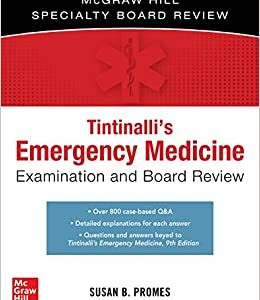
Tintinalli’s Emergency Medicine Examination and Board Review (The Mcgraw Hill Specialty Board Review) 3rd Edition
$12.99 Add to basket -

Restoration of Facial Defects with Digital Technology 1st Edition
$14.99 Add to basket -

Anti-Aging Pharmacology First Edition
$13.99 Add to basket -

Atlas of Suturing Techniques: Approaches to Surgical Wound, Laceration, and Cosmetic Repair, 2nd Edition
$14.99 Add to basket -

Advances in Cosmetic Surgery, Volume 5-1)
$14.99 Add to basket -

Hair Transplantation 6th Edition
$12.99 Add to basket

